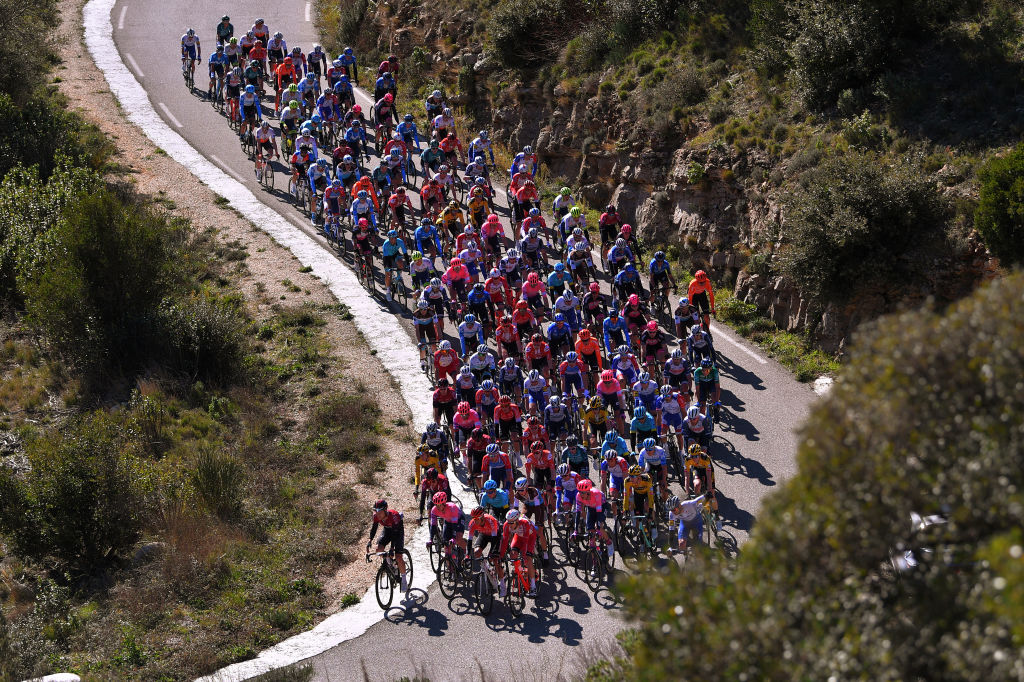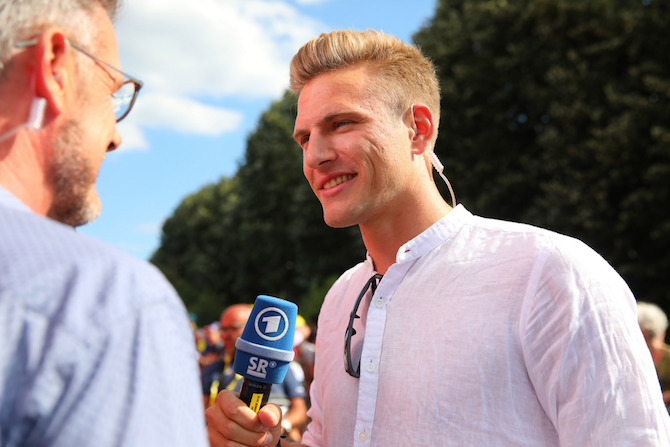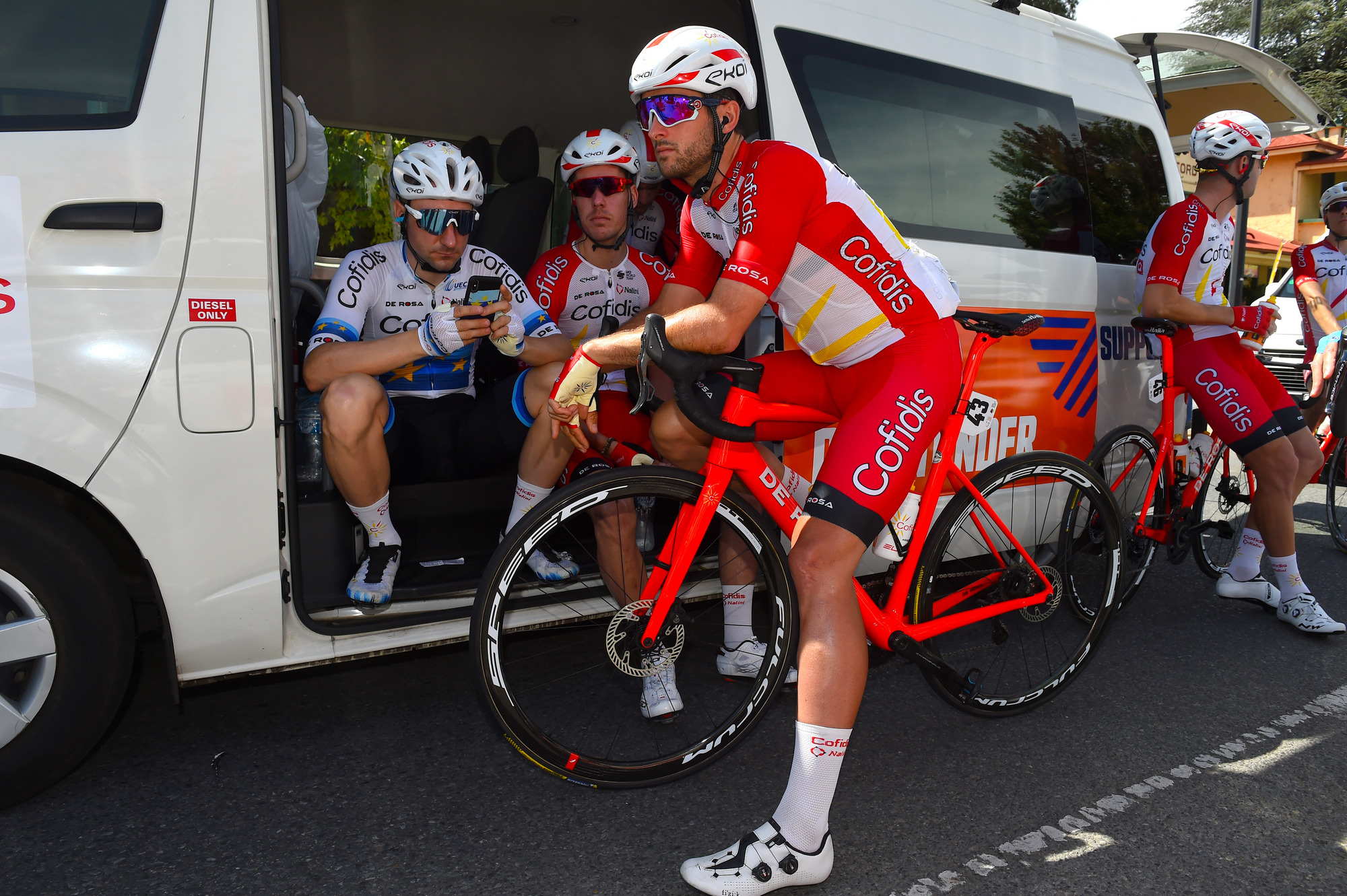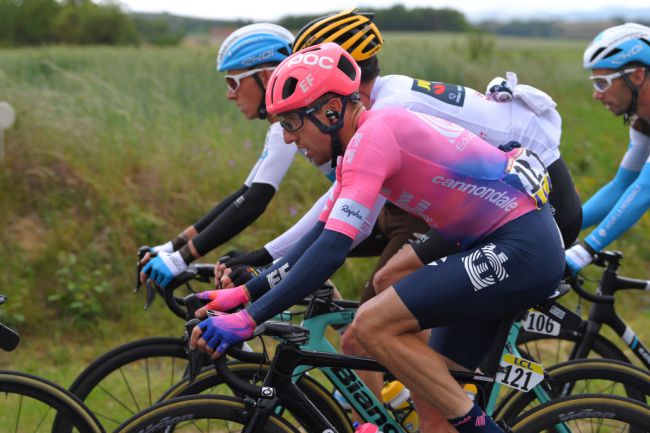Racing thoughts: Professional cycling and mental health
Procycling magazine examines the psychological pressures at the highest level of the sport

This article was first published in Procycling magazine: the best writing and photography from inside the world's toughest sport. Pick up your copy now in all good newsagents and supermarkets, or get a Procycling subscription.
Professional cyclists are portrayed as heroes – latter-day gladiators whose toughness and exploits shame the Premier League footballers who cry over rolled ankles and feign agony at an opponent's lightest touch.
I've often found it difficult to buy into cycling's iconography of suffering and heroism. Yes, cyclists push themselves to complete extreme physical feats, and the dogged determination that underpins those performances is fascinating. However, it is also true that at the top level, at least, generally the athletes are very well-supported and live in a different reality from those of us in the 'real world'.
I once hypothesised that if you gave a civilian the same regular public praise, encouragement and basic aid an athlete receives, their productivity would skyrocket. Cyclists don't have to worry about cooking for themselves at a major race, checking in, doing laundry, going through airport security, queuing, navigating – it's all taken care of.
"I never had to think," Boy van Poppel, now a Roompot rider, recalls to Procycling of the start of his career at the Rabobank Continental Team.
Cyclists are mostly lauded by fans and generally celebrated. Then there is the pay cheque – on the male side at least. It won't necessarily land them in a Forbes list alongside an F1 driver, but for some it will buy entry into a tax haven where they can be neighbours with one.
That's the shiny side of the coin that you see, the side we journalists admittedly glorify, and that athletes perpetuate. This story is not about that. This story is about the other, tarnished side of the coin that shows what cyclists really are – fallible people who can feel lost just as quickly as they are loved.
Get The Leadout Newsletter
The latest race content, interviews, features, reviews and expert buying guides, direct to your inbox!
Marcel Kittel experienced that when he went from winning 14 races with Quick-Step in 2017 to two in his first season at Katusha-Alpecin. The uneasy transition was well documented, but not within the context of the mere total five victories the team marked all year.
"You know, after 2018," Kittel explains, "I learned again what a business it is that we are in. It's not a sport in the first place – it's a business, and that's something you don't really realise as a neo-pro. It really is a lot of expectation from other people. If you're performing well, everyone is happy, and if everything is not going to plan then not everyone is happy. That's something you have to learn to deal with.
"A lot of it was black in 2018. I don't have to hide that," he says. "It goes very quick that you feel that you're on your own, and then it's hard to see the reasons why you're actually doing this.
"Now I'm more relaxed and in a good place with myself. I know where I want to go. Apart from everything else that happens around you, you need to know where you want to be – on the top again."

I began to conceptualise an article on mental health and the WorldTour last October following increasing, albeit fleeting mentions of sports psychologists in interviews. Michael Matthews, the 2017 Tour de France green jersey winner, consulted with one after his crash and injury-marred 2018 Classics campaign. That year, the cobbles began to resemble brick walls and the Team Sunweb rider became almost possessed about bulldozing them down to salvage something of his spring.
"It was helpful just talking to someone totally out of my circle that has no real influence on the team, on anything," Matthews says. "He was trying to make sure I could relax at the right times and go into races with a cool head, instead of racing on emotions all the time."
I spoke with more than a dozen WorldTour individuals over the course of a few months specifically and non-specifically about mental health. Was it possible that the single-minded determination that defines a winner has a darker role in causing depression? Is there a fine line between Tour-de-France-contender-fit and pushing beyond to an unhealthy level, to the point of being clinically underweight?
"Motivation tends not to be the issue with anyone in the elite field. It's actually the issues that come with being overly motivated, breaking yourself and then becoming undermotivated because you've broken what you have inside to be able to manage," says Kittel's former Katusha-Alpecin teammate, Nathan Haas.
'Old-school cycling is just, 'Get over it''
Tragically, during the time I was interviewing doctors, directors and riders, retired Australian pro Jonathan Cantwell and USA track world champion Kelly Catlin both committed suicide. Sports psychology was thrown into the spotlight.
Dr David Spindler was the head of psychological science and athlete welfare at the Dimension Data team at the time and privately consults with riders including Haas and Rohan Dennis, among others.
Spindler has an outside perspective on cycling. He comes from a golf background and has personally suffered from, and managed, bipolar disorder since his twenties.
"Any psychological science is not something that is old-school cycling. Old-school cycling is just, 'Get over it.' Concussion? Just keep going," he says.
"The riders have got no outlet because everyone within that old bubble says, 'That's not the way it's done.' It's man-up, or even woman-up. You have a look at the female peloton, and it's still so male-centric, it's out of control. Most times people just don't understand how to actually get help. That's the big kicker."
Sports psychology is commonly associated with techniques designed to help an athlete see and believe they can win, but there is a more relatable, human element to it.
"It's not about the visualisation or the breathing techniques or whatever, I think that's bullshit," says Tejay van Garderen.
"I feel like a lot of it is more just figuring out the things that bother your normal life so that you can then not stress about them getting into a bike race. That's a bigger help."
Spindler was introduced to Dimension Data, when it underwent a performance team overhaul by new head coach, Dr Daniel Green. Spindler says his role, which involves talking to riders in person or over a video call – he insists on seeing their faces – is more to do with the general welfare of the athletes: talking about areas such as job security, their finances, 'hopeless' time management, and their home life.
"If there is a performance problem, then we work that out, but a lot of the time detriments to performance are not on-the-bike stuff at all. I'm making sure they're okay to start with, making sure they know they're supported. What I'm getting now is a lot of athletes dumping because they've never had it before," says Spindler on his recent experience.
"A lot of it is how we can get the overall team to communicate with the athlete better, making sure that the line of communication from the management side is effective enough that it makes the athletes perform better. That is only going to happen if they buy into the idea that the performance staff actually give a shit about them. I'm not saying they didn't in the past, but that's how a high-performance team works. Every single person along that tree has exactly the same amount of buy-in. That's what we're trying to do."
Haas, who is vocal about mental health, says the majority of riders who seek counsel with sports psychologists do so independently. The 30-year-old believes WorldTour squads and even the UCI are being neglectful of the emotional needs of the peloton.

"A few teams are now hiring internal sports psychologists, which should be the new UCI minimum. I think that should be as essential as having team doctors," he says.
"It's something I see all around me, and I'm not immune to it myself. Alcohol abuse is a massive issue, even sleeping tablets are something I see people using in dangerous ways. Then I also see people going down these super-focused roads, down very dark paths, or they start using dark language or have dark reactions to things that aren't even a thing.
"For what it's worth, it's a really hard thing that we do," Haas says. "It's a very privileged thing that we do, but there is a duty of care that is not being taken care of. Any time that you're in an institutionalised environment, it's dangerous."
Spindler says common elements of a cyclist's job can sow seeds of potential destruction. Transferring between teams is not necessarily as simple as throwing on new kit, familiarising oneself with a new bike and rehearsing sponsor lines with the now ever-present press officer.
"I'm someone who needs to enjoy being in the group and that means for me, in the first place, getting to know everyone, which takes time," Kittel says. "I know everyone in the team now, also a little bit their private stories, and that makes a huge difference.
"I think especially when you come into a group as a sprinter, or as a guy who should lead the team, you need to create a personal relationship with the people around you."
For riders outside of cycling's European heartland, there is also the cultural adjustment of moving to a foreign country, or even continent, and learning a foreign language and customs.
"I had no friends when I first moved to Spain. It was horrible," admits Haas. "My first two years were so lonely, but I knew I had to push on if I wanted to be a cyclist."
Dan Martin was the lone wolf in a two-year tenure at Quick-Step – the climber in a sprint and Classics team who could still nail a top-10 finish at the Tour de France. He then transferred to UAE Emirates, won stage 6 of the Tour and finished eighth overall.
I'd have assumed that would count as a successful if not defining season for the Irishman, but he corrects me. Martin had a good Tour, but he brushes over that to talk about what he saw as an inconsistent start to the year.
"The start of last year was 100 per cent psychological. Sometimes you need a professional to press that reset button as well, because people around you can see it coming but can't say what needs to be said," he says.
"It happened when I left Cannondale to go to Quick-Step, who use a sports psychologist there. After a 10-minute meeting I walked out and went, 'Oh yeah!' Something just clicks. It happened to me last May as well."
Martin went on to win stage 5 of the Critérium du Dauphiné, before winning at Mûr-de-Bretagne at the Tour.
"You can see it when guys change teams and the adaption into a new environment, maybe getting a big, fat pay cheque. A lot of young riders have a good first two seasons, suddenly they get a big pay cheque and then disappear. That's psychological. It's clearly the pressure getting to them and that's where a sports psychologist would definitely help," says Martin.
"We're quite vulnerable as cyclists because you live in a bubble, so you do get a little bit wrapped up. Sometimes you need someone to bring you back down to earth. That's why I worked with my own sports psychologist last year, and I'm lucky to have an incredible wife, who gives me a hit around the face sometimes."
When a cyclist says they don't read media, it nearly always means that they do.
"Even the biggest stars in the world worry about how they are perceived, and how they're perceived by others," says Spindler.
Think Mark Cavendish weeping after he won stage 5 of the 2010 Tour, following months of public scorn where he was labelled the 'bad boy of cycling'.
"All they're worried about is, 'I'm going to the Tour de France and if I don't win this, it won't happen,'" says Spindler.
"Well, that's not going to happen anyway because you're so worried about it. Why are you racing the race three weeks before the Tour de France? It hasn't even happened yet, but there are constant scenarios going through their head. It's reactionary."
Spindler says performance anxiety and maladaptive eating are two big issues affecting the WorldTour peloton.
"Weight sensitivity is large in professional cycling. It's probably in equal measure in both male and female, which is outside the norm of the general population. Weight sensitivity in the general population is female-centric," says Spindler.
"You see sports directors pinch riders' stomachs and ask, 'How much over are you?' That's the coach, the sports scientist, the nutritionist's problem. They're the only ones who should ever say anything about weight."
Truthfully, the entire industry is guilty of talking about weight, and it's particularly prevalent at the beginning of a season, where a rider's physique from cheekbone to backside is analysed and rated from 'Watch out!' to 'He has no chance of winning the Tour de France.'
Trek-Segafredo's Richie Porte, who regularly works with a Tasmania-based psychiatrist, is, however, resigned to these sorts of comments.
"If you turn up to a race a couple of kilograms over what you were at the Tour Down Under, the amount of riders that say stuff to you is…" Porte trails off.
"In the modern world, you don't get away with commenting on that [your weight], but you have riders and staff who think it's their right to. You're in a sport where power to weight is a huge factor. That's how it is."
Obsession with weight
'Eating disorder' is not a phrase that gets thrown around the peloton, but diets and crash dieting certainly are.
"It's a strange sport because you have to have the energy to be able to burn 4,000, sometimes 5,000 calories in a day, but at the same time you have to be as lean as possible because weight is one of the biggest performance gains you can make," says Van Garderen.
"It's, like, how do you find that balance between being as light as possible while still having the energy to do the work? That can cause anxiety."
I once asked four-time Tour de France winner Chris Froome in a December interview what his ideal race weight was, after he remarked he needed to lose a bit before the start of the season. I wished I hadn't, because his answer was a couple of kilos more than what I – a 178cm female – was tipping the scales at then.
"With such a tight margin between abilities, guys are always trying to push it and it's quite easy to go too far, not eat enough and watch your health deteriorate," says Michael Woods, who was an international-level runner before injuries directed him towards cycling.

"I experienced that as a runner. My diet was terrible, and I really was just counting calories and trying to lose weight all the time," he says.
"It's one of the main reasons I ruined my running career. So, fortunately, I have that experience to draw on now as a cyclist.
"As part of my profession, I'm constantly thinking about how light I am and trying to make sure I am light. But I also try to make sure that's not to the detriment of my physical and mental health. I'm a bit older now; I realise that cycling is not the be-all and end-all. If I lose a race because I choose to eat a meal, I'm fine with that."
You can usually pick a seasoned racer from a neo-pro at the dinner table. A neo-pro will shovel food like it's their last meal, while the calculating campaigner may have a glass of wine or a dessert – but not both. Team chefs cook creatively to ensure that the riders get that four-figure number of calories needed. But on the flipside of this, there are also real anecdotes of riders living off as little as just yoghurt, to ensure they are skinny.
"Every professional has gone through the diet thing, this whole phase of trying to lose weight," says Martin.
"I lived in France for three years and they're obsessive about weight. It comes down to psychology as well, and self-confidence. In this bubble you get sucked into fads or rumours: this team is eating this, or whatever. You have to trust yourself."
UAE Team Emirates sports director Neil Stephens believes that directors should have a say on weight, before adding that depression is also an issue among riders in the peloton.
"We should be involved in a discussion, the same as the physiologist, psychologist and team doctor to try to address a problem. But gone are the days that a director can say to someone that they are fat," Stephens says.
"It's the role of the physiologists or coaches to teach the riders what they should be eating, when they should be eating and have confidence in how much they're eating. Then that has a flow-on effect psychologically – they're not going to worry about something like, 'Should I eat that potato chip or not?'"
Spindler, however, questions the accountability of cycling performance staff, who unlike other sports such as football, are rarely, if ever, in the public firing line if a rider or a team begins to fail.
"There is none," he says.
To victimise the peloton and squarely chastise team staff for perceived emotional neglect, however, would be amiss.
"The way I work is based on the mental health of people; I am present to it. As opposed to what you may see, I am very close to the riders, I suffer, I lose sleep," continues Stephens.
The peloton itself is handy at the art of mind games. Using the press to psyche out rivals or propagate their own myths ahead of a race, with carefully selected words, isn't uncommon.
Spindler calls it the "Tiger Woods syndrome".
"Look at Peter Sagan. He's won bike races before he has even started at times. The person doesn't matter – it's the context that matters," he adds.
There are perks to the fabled shiny side of the coin, although they're not the first things retired athletes recall most fondly when they are looking back on their careers.
The tarnished side of life as a professional cyclist, however, if it's left unchecked, can have fatal consequences in an insensitive, competitive and sometimes dangerous environment. It takes a team of people to make and maintain a cycling 'star', but not necessarily to break one.
"People are starting to realise that it's not a marginal gain. Your head space is your core driver," concludes Haas.
"The happy headspace is probably the most important thing in the game, but staying there? That's the art, and it's not easy."
Procycling magazine: the best writing and photography from inside the world's toughest sport. Pick up your copy now in all good newsagents and supermarkets, or get a Procycling print or digital subscription, and never miss an issue.
Follow @Procycling_mag